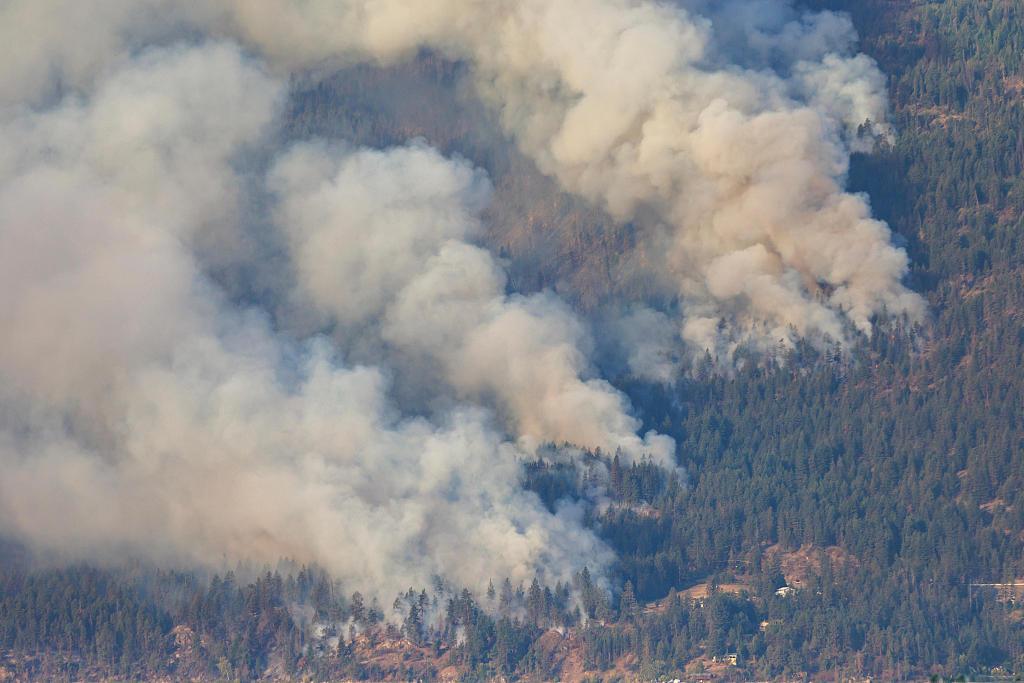Extreme weather could get worse
- By Mitchell Blatt
 0 Comment(s)
0 Comment(s) Print
Print E-mail China.org.cn, September 18, 2023
E-mail China.org.cn, September 18, 2023

Smoke billows during the McDougall Creek wildfire in West Kelowna, British Columbia, Canada, on Aug. 19, 2023. [Photo/VCG]
If you look at the dynamic "Global Temperatures" map on NASA's website, you can see the historic temperature change over time across the planet as the timeline goes from 1880 to the modern day. By 2019, the entire planet is awash in red, orange, and yellow colors, indicating temperatures much higher than the historical average in every country and crevice of human inhabitance.
If the timeline went to 2023, the map would look even more dire. That's because the summer of 2023 was the hottest ever, according to ocean monitors. July was the hottest month in recorded history. Next July could be worse.
As we near the end of the summer, scientists who study climate and weather want us to look back at the unprecedentedly high temperatures and weather disasters as something akin to a "new normal." Unless we do something quickly, we face dealing with more and more dangerous and expensive natural disasters in the future.
Forest fires sent smoke from Canada across the North American continent, causing New York City to have the worst air quality in its recorded history. Unprecedented rains fell on Vermont and the Northeastern United States in just a couple of days in the middle of July, which exceeded the amount that area would usually receive in two months and caused extreme damage to homes and businesses. Around the same time, flash flooding in Bucks County, Pennsylvania – north of Philadelphia – killed nearly a dozen people.
Northern China also experienced extreme flooding in late July. Typhoon Doksuri (known as Super Typhoon Egay in the Philippines) passed over the northern island of the Philippines and made landfall in China's Fujian province on July 28. Winds at landfall were measured at 180 kilometers per hour (112 miles per hour). More than 400,000 people were evacuated, and traffic on train routes and highways was suspended.
The storm continued bringing heavy rains over Anhui, Henan, and Hebei en route to Beijing. Rainfall in Beijing was the heaviest in 140 years. The water level in Zhuozhou, Hebei province, reached 10 feet, submerging first-floor homes in apartment complexes and even some second-floor homes.
Across multiple countries, the known death toll from Doksuri totals 137 people, and the cost exceeds $15 billion. In inflation-adjusted terms, that makes Doksuri the third-costliest Pacific typhoon ever. Five of the top ten most expensive all occurred in the past five years. In addition, there were floods in Libya, cyclones that battered Myanmar and Bangladesh, and wildfires in Maui, Hawaii, that killed at least 115 people.
Erich Fischer, a researcher specializing in climate studies at the Swiss Federal Institute of Technology, is concerned that natural disasters could get much worse in the future – and in ways we cannot predict.
"So far, today, we clearly haven't seen anything close to what's possible in today's climate – let alone what's possible in the near future," he said in an interview with the American news outlet Politico.
Dale Vince, the founder of Ecotricity, a British wind energy company, said, "The climate crisis is killing people – the U.N. estimates 4 million globally and counting."
Robert Reich, the secretary of labor during President Clinton's administration, wrote, "This year, the U.S. has already faced 23 separate extreme weather disasters that caused at least $1 billion in damage ... Don't tell me we 'can't afford' to address the climate crisis. The truth is we can't afford not to."
Young climate activist Greta Thunberg pointed to the extreme weather records and called for a "strike for climate justice," which actually took place on Sept. 15.
The strategy needs to be twofold. We need to decrease carbon emissions as much as realistically possible. That is already happening with people using electric cars and other green technologies. Electric car sales in the U.S. were higher last year than ever before.
At the same time, we also need to implement mitigation strategies. We need to find ways to predict the risk of natural disasters ahead of time and find ways to build more resilient cities.
Mitchell Blatt is a columnist with China.org.cn. For more information please visit:
http://www.china.org.cn/opinion/MitchellBlatt.htm
Opinion articles reflect the views of their authors, not necessarily those of China.org.cn.






Go to Forum >>0 Comment(s)